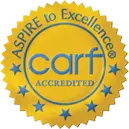Clients participating in Alternative Options mental health treatment programs will receive care from our multi-disciplinary team which consists of therapists, certified counselors, and psychiatrists. Our mental health treatment center will work collaboratively with you and involved family members to ensure you receive the care and treatment needed to support and guide you along your journey to recovery and wellness.
Alternative Options goal is for clients to empower themselves by identifying and focusing on their personal strengths, building greater self-awareness, and learning new life skills. Through our mental health counseling, our clients learn to take responsibility for their personal wellness by obtaining new tools and coping skills that will assist in increasing their quality of life and help them move past the issues that brought them to treatment.
Mental health treatment includes:
- Weekly Or Bi-weekly Individual Therapy
- Family Therapy
- Dialectical Behavioral Therapy (DBT) Groups
- Cognitive Behavioral Therapy (CBT) Groups
- Trauma Focused Groups
- Family Process Groups
- Psycho-education Groups
- Art And Music Therapy
- Reiki
- Yoga/Trauma Informed Yoga
- Experiential Therapy Groups
- Intensive Case Management
- Diagnostic Testing
- Family/Significant Other Support Groups
- Psychiatric And Medication Evaluation And Supervision
- Genetic Testing
- Nutritional Assessment/Support
- Free Aftercare Support for Relapse Prevention
Why Mental Health Treatment is Important
Mental health is a key part of our overall well-being. Just as we care for our bodies by addressing physical problems, it’s equally important to care for our minds when they are affected by emotional or psychological challenges.
Addressing these challenges can improve our quality of life, relationships, and physical health.

Rising Prevalence of Disorders
The Importance of Early Intervention and Comprehensive Mental Health Treatment
For example, if you’re struggling with depression, a comprehensive approach might explore not just feelings of sadness, but also your daily habits, relationships, or past traumas.

The Role of Specialized Mental Health Treatment Centers
- Expertise: We have a team of professionals skilled in various therapies and treatments, ensuring you get the best care.
- Holistic Healing: We believe in treating the whole person. This means not just addressing the mental illness but understanding its root cause, allowing for deeper healing.
- Diverse Therapies: From art therapy and yoga to more traditional approaches like cognitive behavioral therapy, our specialized centers offer a wide range of treatments. This ensures you have access to various tools and techniques that cater to your unique needs.
- Community Support: Being in a place where others are also seeking healing can provide a sense of belonging and support. It’s a reminder that you’re not alone in your journey.
Understanding Mental Health Challenges in Mental Health Treatment

Depression and Anxiety: The Silent Epidemic
Anxiety can manifest as persistent worry, physical symptoms like rapid heartbeat, or avoidance of certain situations. Often, depression and anxiety can occur together, making it hard for you to determine the root of your feelings.
PTSD/Trauma: Unseen Wounds
PTSD is a condition where a person relives traumatic events through flashbacks or nightmares, often feeling on edge or detached from their surroundings.
Substance Abuse: The Escapism Trap
Turning to substances, whether drugs or alcohol, can sometimes seem like an easy escape from life’s challenges. In 2021, an estimated 46.3 million people, or 16.5% of the population aged 12 or older, had a substance use disorder.
Eating Disorders: The Internal Struggle
Eating is a basic human need. But for some, their relationship with food is complicated. Around 9% of the U.S. population will face an eating disorder in their lifetime.5
Co-Occurring Disorders: Complex Interactions
Diving into Mental Health Treatment at Alternative Options: Our Differentiator

Historical Legacy and Impact
Multidisciplinary Team
- Psychotherapists who delve deep into emotional and cognitive patterns.
- Registered addiction specialists that understand the nuances of substance struggles.
- Psychiatrists who can guide on the medical aspects of mental health.
- Dietitians who ensure that the body is getting what it needs to heal.
Treatment Spectrum
- Mental health issues like depression, anxiety, and PTSD
- Substance abuse and addiction-related challenges
- Eating disorders from anorexia to binge eating
- Co-occurring conditions
- Other psychiatric disorders
Our Comprehensive Mental Health Treatment Programs: Crafting a Tailored Path to Recovery
At Alternative Options, we offer varied mental health treatment programs to best suit your unique needs. This helps ensure that you get the most effective treatment tailored just for you.

Intensive Outpatient Program (IOP)
The intensive outpatient program, often called IOP, is a step above traditional therapy sessions. While it’s less rigorous than partial hospitalization, it’s still thorough.
- Program Structure: You attend sessions for a few hours, multiple days a week. This allows for a deeper dive into mental health treatment without needing a full-day commitment.
- Therapeutic Approach: During these sessions, you’ll engage in group therapy, one-on-one counseling, and other therapeutic activities.
- Middle Ground: IOP is suitable for those who need more than standard therapy but aren’t in a position to commit to full-time hospitalization.
- Life Balance: The flexibility of this program allows you to continue with daily activities, like work or school. You get to stay at home, making it a more comfortable option for many.
Partial Hospitalization Program (PHP)
Sometimes, more intensive care is needed, but not quite to the extent of full hospitalization. That’s where the partial hospitalization program comes in:
- Program Structure: A PHP is a 5-day-a-week program, spanning most of the day.
- Day Structure: Despite its name, you won’t be staying overnight. Think of it as a full day of school, dedicated to your mental health treatment.
- Therapeutic Approach: The program includes a mix of individual therapy, group sessions, and other therapeutic activities.
Who Can Benefit
It’s a great choice for those who need something more intensive than IOP but don’t need 24-hour hospital care. By the end of each day, you return home, allowing for a balance between intensive mental health treatment and personal time.
Outpatient Therapy
For many, the traditional outpatient therapy approach is the most suitable. It’s flexible, personal, and can be incredibly effective.
- Session Types: Predominantly one-on-one, but can also involve group sessions or family therapy based on needs.
- Frequency: Meetings can range from once a week to several times a month.
- Time Commitment: Outpatient mental health treatment is less time-intensive than an IOP or PHP, allowing for a balance with daily routines.
- Customized Care: Outpatient mental health treatment offers tailored sessions for individuals, couples, or families.
- Adaptability: This approach can be molded to fit your lifestyle and therapeutic requirements.
Mental Health Treatment Services and Therapies at Alternative Options
Behavioral and Psychological Approaches
- Cognitive Behavioral Therapy (CBT): CBT is a structured approach that helps you identify and change negative thought patterns. By addressing these patterns, you can alter behavior and mood. Cognitive-behavioral therapy has been shown to reduce relapse rates by 50% for depression.7
- Dialectical Behavioral Therapy (DBT): DBT teaches coping skills to manage intense emotions, improve relationships, and decrease self-destructive behaviors. This therapy emphasizes the balance between acceptance and change.
- Family System Approach: This approach addresses family dynamics and relationships. It helps families understand patterns and support a loved one in their healing process.
Artistic and Experiential Therapies
- Art Therapy: Studies indicate that art therapy can reduce symptoms related to anxiety and depression.8 With a certified art therapist on staff, we help you use artistic mediums as a tool for self-expression and healing.
- Music Therapy: Music therapy involves the use of musical activities to foster emotional expression, improve mental well-being, and develop social skills. Listening to or creating music can act as a therapeutic bridge, aiding in communication and relaxation.
- Experiential Therapy: This therapy allows you to re-enact past experiences or situations, helping you to identify emotions and confront unresolved issues.
Supportive and Holistic Treatments
Beyond traditional therapies, we also offer supportive and holistic treatments that focus on overall well-being.
Nutritional Support and Counseling
Psychoeducational Groups
Yoga and Trauma-Informed Yoga
Yoga promotes relaxation, flexibility, and mental clarity. Trauma-informed yoga is designed to be sensitive to the needs of those with traumatic experiences. One study found that trauma-sensitive yoga treatment can lead to significant reductions in PTSD symptoms.9
Reiki
Additional Services
Discover Your Path to Wellness
Contact Alternative Options Today
Reach out to us today for more information.
Resources
1 https://www.nimh.nih.gov/health/statistics/mental-illness
2 https://www.chcf.org/publication/2022-edition-mental-health-california/
3 https://www.samhsa.gov/data/sites/default/files/reports/rpt39443/2021NSDUHFFRRev010323.pdf
4 https://www.ptsd.va.gov/understand/common/common_adults.asp
5 https://anad.org/eating-disorders-statistics/
6 https://www.cdc.gov/nchs/pressroom/nchs_press_releases/2021/20210714.htm
7 https://www.ncbi.nlm.nih.gov/pmc/articles/PMC2826176/
8 https://www.ncbi.nlm.nih.gov/pmc/articles/PMC8397377/



